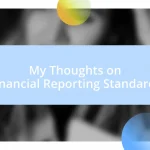Key takeaways:
- Understanding and adhering to charity tax compliance regulations, like obtaining 501(c)(3) status and filing Form 990, is crucial for maintaining transparency and trust with donors.
- Thorough documentation and organized record-keeping significantly enhance credibility and efficiency, safeguarding against potential compliance issues and penalties.
- Utilizing expert advice, engaging with community forums, and pursuing continued education are vital for staying updated and successful in navigating the complexities of charity tax compliance.
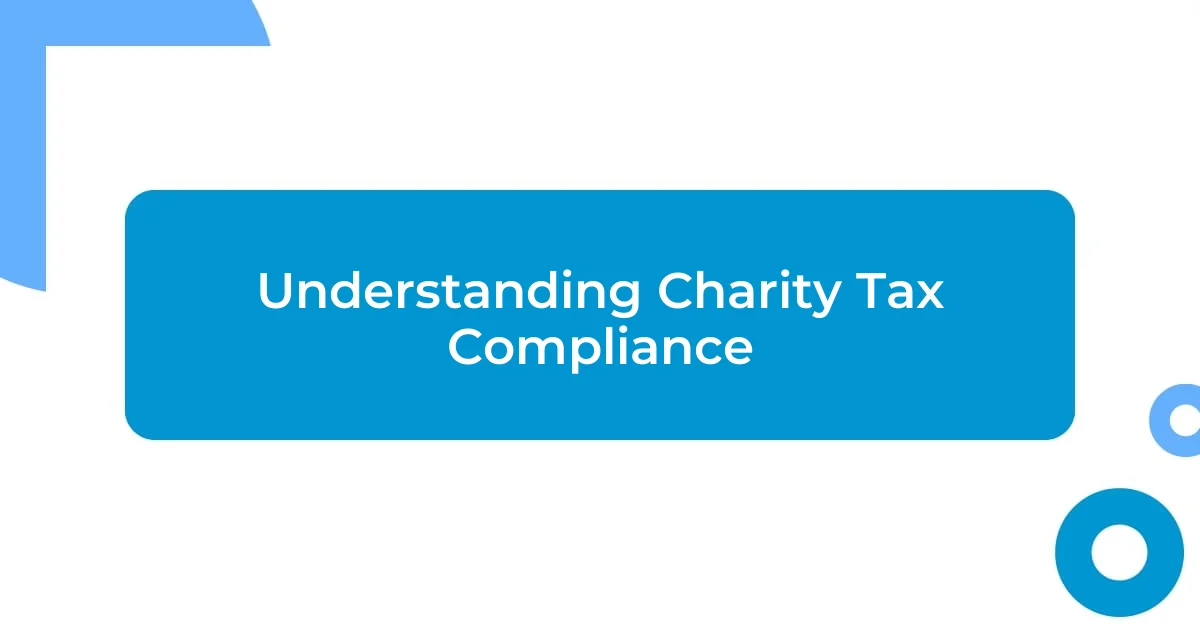
Understanding Charity Tax Compliance
Navigating the world of charity tax compliance can feel overwhelming at first, I remember feeling a mix of anxiety and determination when I started my journey. Understanding the rules and regulations is crucial for any charity, as non-compliance can lead to severe penalties and loss of tax-exempt status. Have you ever thought about how much time and effort goes into ensuring every donation is accounted for? It’s not just about the money; it’s about maintaining trust with supporters.
I found that breaking down the compliance process into manageable steps really helped ease my worries. Each jurisdiction might have its unique requirements, but fundamentally, the goal is to keep everything transparent and accountable. I vividly recall the day I finally sorted out our annual filings—what a relief! It was a reminder that diligence pays off in the long run, and I was proud to know our organization was on solid footing.
Embracing charity tax compliance isn’t just a burden; it can be an opportunity for growth and connection with our community. For many, understanding tax regulations might seem tedious, yet it opens pathways for better communication with donors and stakeholders. Have you considered how foundational compliance can lead to unwavering support from your community? It’s an enlightening realization and a key part of sustaining our mission.
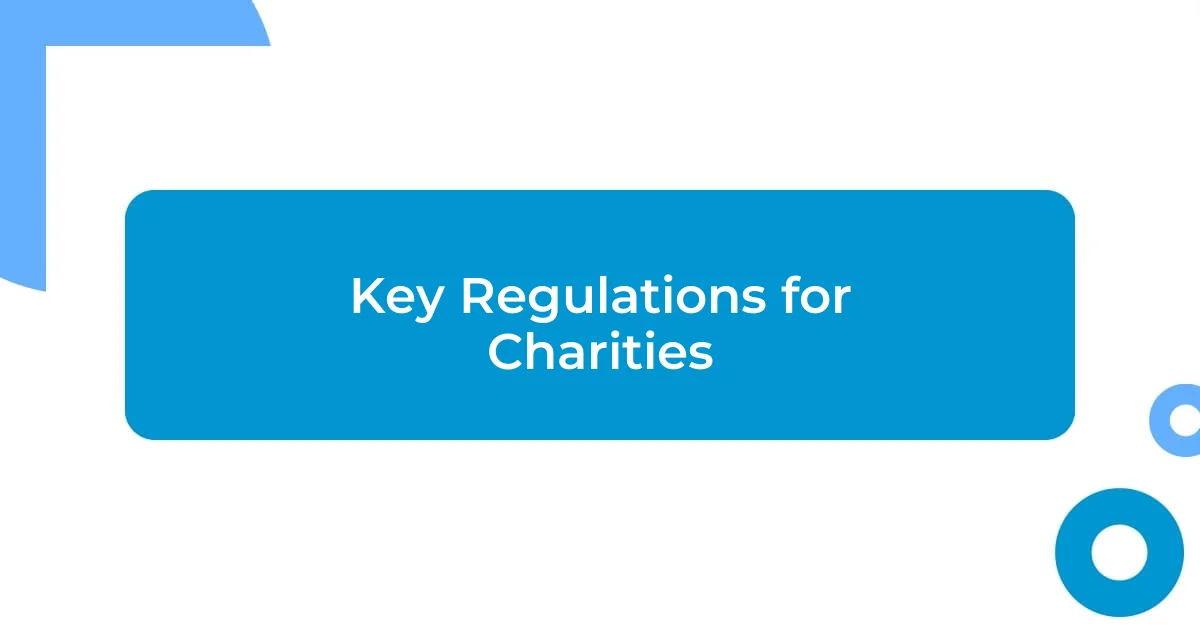
Key Regulations for Charities
Key regulations for charities often revolve around ensuring transparency and accountability, which ultimately fosters trust with donors. I still remember poring over the legal requirements late into the night when I first became involved in charity work. It felt daunting, but it was a wake-up call that laid a solid foundation for our operations.
Here are several key regulations I found particularly important:
- 501(c)(3) Status: This designation is critical in the U.S. as it grants tax-exempt status. I think back to the excitement of receiving that approval letter; it felt like a significant milestone.
- Annual Reporting: Most charities are required to file Form 990. The first time I filled it out, I felt a mix of pride and anxiety—it was a testament to our hard work.
- Unrelated Business Income Tax (UBIT): Charities must pay taxes on income not related to their exempt purpose. Learning this helped me manage our fundraising strategies effectively.
- State-Specific Regulations: Each state has its own compliance rules, and I discovered this when I had to navigate different filing requirements. It felt overwhelming, but it reminded me of the importance of being diligent.
- Donor Disclosure Requirements: Understanding how to handle donor privacy rights was eye-opening. It reinforced the responsibility I felt toward our supporters.
Keeping these regulations in mind is crucial, as they serve as the backbone of a charity’s operations. Through all my experiences, I realized that compliance isn’t just about avoiding penalties; it’s about respecting the trust that our supporters place in us.
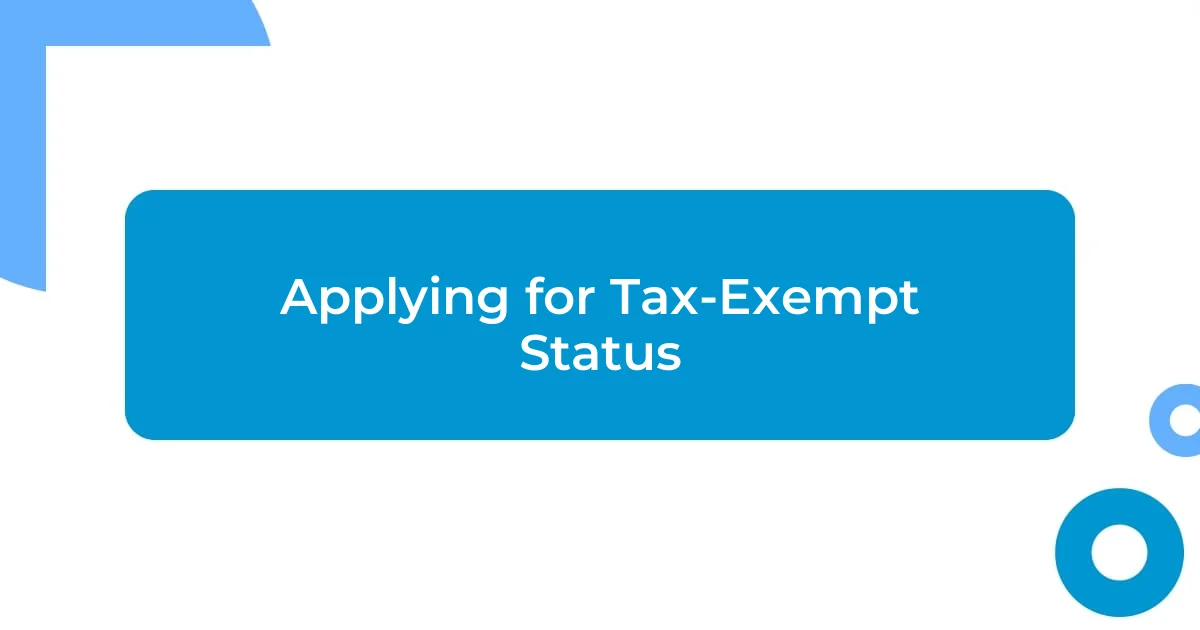
Applying for Tax-Exempt Status
Applying for tax-exempt status can feel like navigating a maze, but it’s a crucial step for any organization aiming to make a difference. I remember sitting at my desk, sifting through countless forms and requirements, specifically the IRS Form 1023. It was a lengthy document, and I could feel the weight of responsibility on my shoulders. Completing it gave me a sense of accomplishment, knowing that I was taking a significant stride toward legitimacy and trustworthiness for our charity.
It’s important to gather all necessary documentation before applying. This includes your organization’s articles of incorporation, bylaws, and details about your governing structure. I learned the hard way that being thorough upfront can save you from months of back-and-forth communication. The day I submitted our application felt surreal; every necessary paper secured and every question answered, it was proof of my commitment to our mission.
To enhance your chances of success, clearly outline your charitable purpose. The clearer the mission, the more compelling your case becomes. When I crafted our mission statement, I poured my heart into it, believing that clarity would resonate with the IRS reviewers. In my experience, putting passion into that narrative not only helps your application but also solidifies your purpose within your community.
| Steps | Description |
|---|---|
| Research Requirements | Understand what documents and forms you need based on your organization’s structure and purpose. |
| Complete IRS Form 1023 | This is the application for 501(c)(3) tax-exempt status; thoroughness is key. |
| Gather Documentation | Compile your articles of incorporation, bylaws, and details about your governing body to support your application. |
| Articulate Your Mission | Clearly define your charitable purpose; a compelling statement will strengthen your application. |
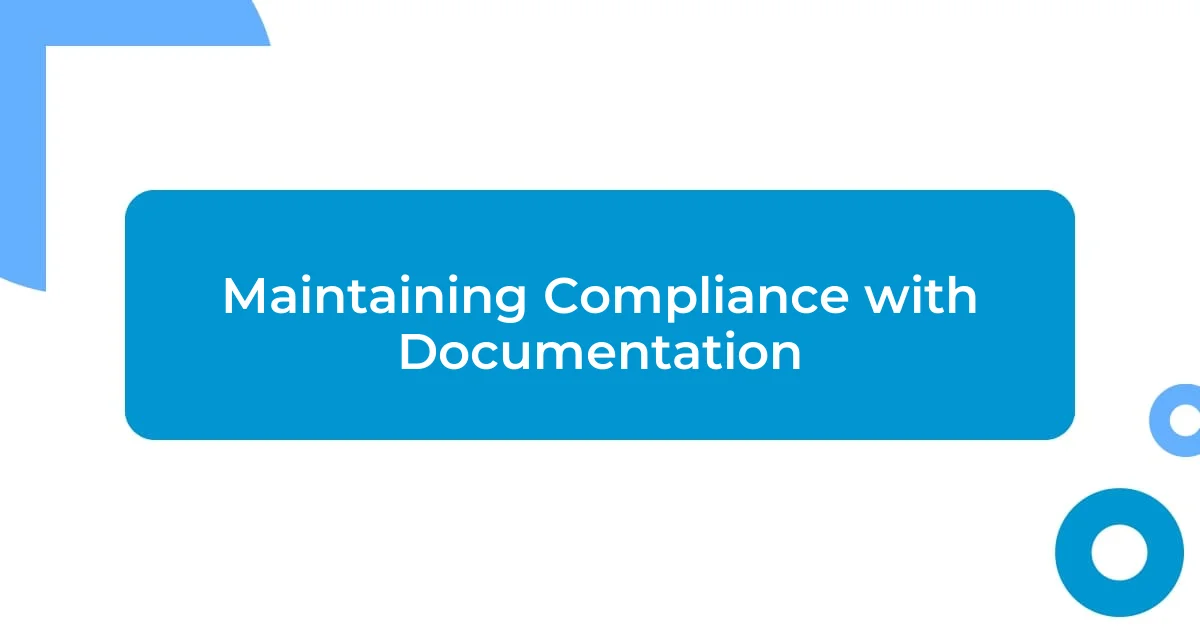
Maintaining Compliance with Documentation
Maintaining compliance with documentation is a journey of discipline and attention to detail. During my early days in charity work, I found myself battling a mountain of paperwork, feeling overwhelmed at times. It struck me that every document, every receipt, was not just a piece of paper; it was a testament to our commitment to transparency and accountability. Have you ever felt that thrill when checking off compliance tasks? I still recall the satisfaction I felt when I organized our files and realized we were ready for our audit.
I learned that keeping meticulous records is vital, especially when it comes to donor contributions and expenditures. I can’t emphasize enough how pivotal this practice was during our first major fundraising event. I meticulously logged every donation, and when it came time for our annual reporting, I felt confident that I could present an accurate picture of our financial health. This attention to detail not only enhances credibility but also builds trust with those who support our mission.
Sometimes, it’s the small things that make a big difference. For instance, I’ve developed a habit of maintaining a digital filing system alongside physical copies. The first time I quickly located a crucial document that I thought was lost gave me immense relief. In moments of panic, it was such a comfort to know that I could access everything I needed with just a few clicks. Ultimately, it’s these systems and practices that keep us compliant and empower us to focus on our core mission. How have you organized your documentation to ensure compliance? It’s a journey worth exploring!
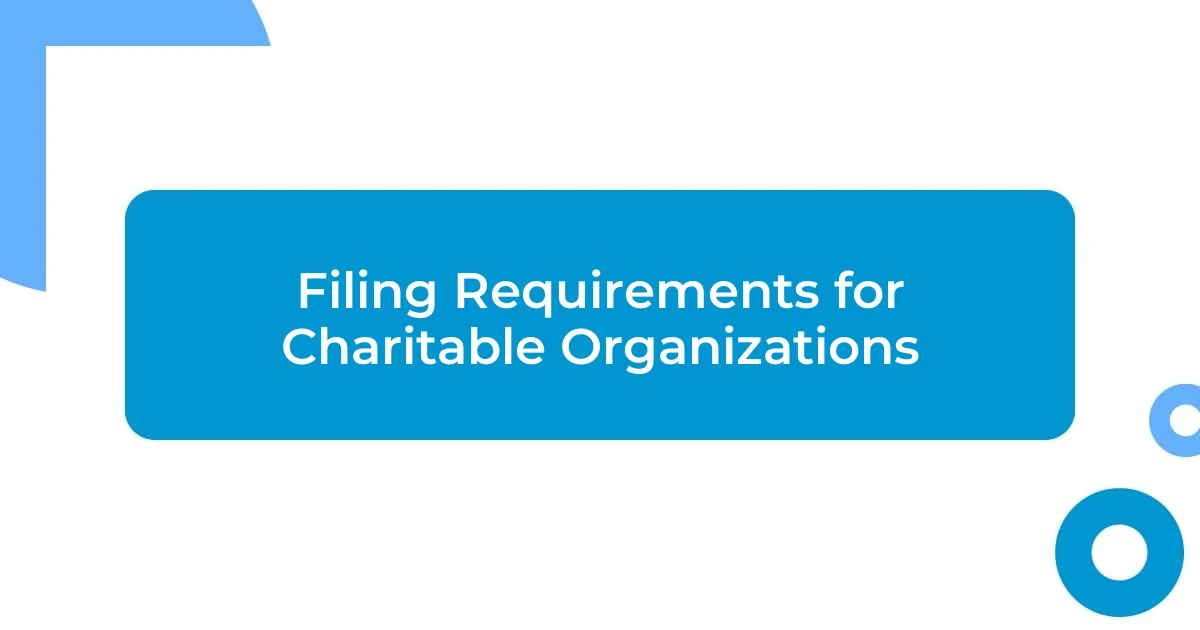
Filing Requirements for Charitable Organizations
Filing requirements for charitable organizations can seem daunting, but I assure you that understanding them is essential for smooth operations. Most charities must file an annual return with the IRS, usually Form 990, which helps maintain transparency. I vividly remember my first time completing this form; the sheer amount of information required had me second-guessing every figure. Finding reliable templates online made a huge difference, though—ensuring I didn’t miss critical details.
Different charities have varying requirements based on their size and type. For instance, smaller organizations, like ours at the time, may qualify to file the simpler Form 990-EZ. I found that breaking down the form into manageable chunks turned a potentially overwhelming task into something achievable. Have you tried tackling a daunting project by dividing it into smaller steps? It changed my approach to filing completely.
Additionally, staying compliant isn’t just about submitting forms—it’s about documentation. Keeping track of all financial records, including donor information and expenditures, is crucial. I learned the hard way when our financial advisor asked for past records that I had to scramble to gather. Now, I make it a point to regularly update and review our documentation. This practice not only fosters efficiency but builds a level of confidence in our processes that I didn’t fully appreciate before. Trust me; it’s worth putting in the effort!
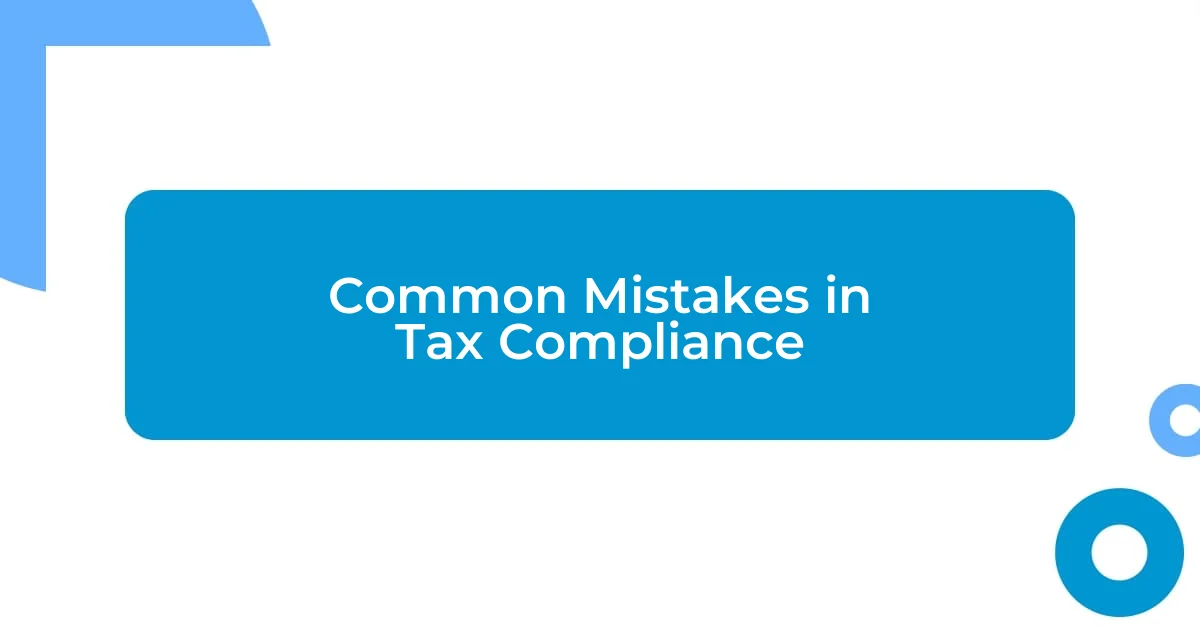
Common Mistakes in Tax Compliance
One of the most common mistakes I encountered in tax compliance was overlooking deadlines. Those dates seemed to sneak up on me, and I remember frantically searching for forms at the last minute. Missing a deadline can not only lead to penalties but can also create significant stress for everyone involved. Have you ever felt that pressure when you’re racing against the clock?
Another pitfall is the inconsistency in understanding rules around donations and their deductibility. Early on, I mistakenly categorized certain contributions, thinking they were all treated equally. But when the audit came around, I realized my error. It taught me that clarity in categorization is essential for transparency. I always ask myself, how well do I really know the regulations? Staying updated makes a world of difference.
Lastly, a lack of communication within the team can lead to disastrous consequences. I’ve been part of organizations where decisions about expenditures and donations were made without adequate discussions. One time, a miscommunication resulted in underreporting our charitable contributions. The frustration was palpable when we had to rectify it later, which could have been avoided with better collaboration. Have you had similar experiences? It highlights the importance of dialogue in maintaining compliance—it’s not just about numbers but about teamwork too.
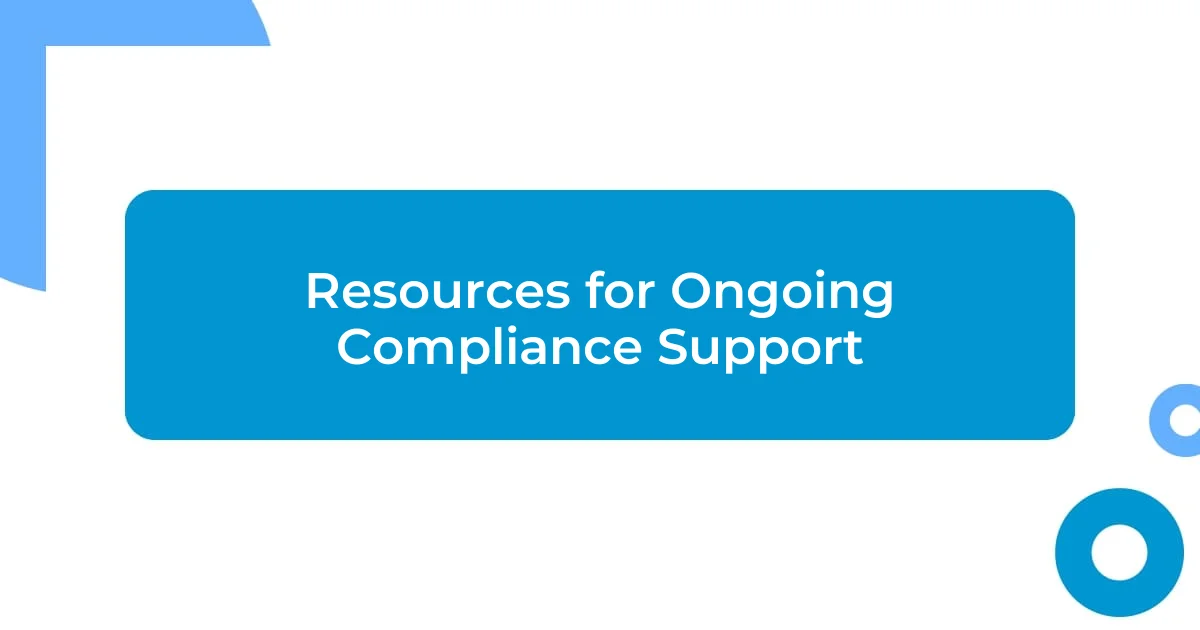
Resources for Ongoing Compliance Support
Finding reliable resources for ongoing compliance support can be truly a game-changer. During my journey, I discovered the importance of connecting with professionals who specialize in charity tax compliance. Working with knowledgeable CPAs and tax advisors not only clarified complex regulations but also provided peace of mind. Have you ever felt overwhelmed by decisions only to realize a quick chat with an expert could have simplified everything? It’s those conversations that made all the difference for me.
Additionally, I found that online communities and forums catered specifically to charitable organizations were invaluable. These platforms allowed me to share experiences and seek advice from others facing similar challenges. I remember posting a question about best practices for documenting donations, and the wealth of responses I received opened my eyes to new strategies. Engaging with peers helps foster a sense of support and camaraderie—how incredible is it to learn from others who have walked the same path?
Finally, I can’t stress enough the value of continuing education. Workshops, webinars, and courses focused on charity compliance were vital in keeping me updated. I once attended a local seminar that covered recent changes in tax laws, and it paid off immensely when I faced a compliance review shortly after. Staying proactive and committed to learning continually shapes your understanding of the landscape. So, what resources are you tapping into for your organization’s compliance needs? There’s always something new to discover that can ease the road ahead.














